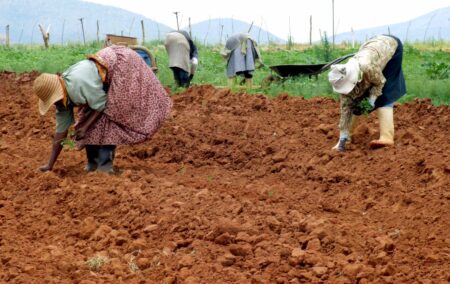South Africans cannot allow a self-serving ANC elite to inflict a Zimbabwe-type disaster on the country.
The death last week of former Zimbabwe president Robert Mugabe has refocused public attention on the land expropriation he unleashed and the economic havoc this has wreaked.
The land grab in Zimbabwe began in 2000, but its economic fallout is still acute. Once the property rights of farmers were destroyed, confidence fell sharply. So too did investment, growth, employment, production, and tax revenues. The government started printing money to sustain its spending, triggering hyperinflation at a globally unprecedented rate of 89.7 sextillion percent within eight years.
Almost 20 years later, food, water, electricity, and fuel remain in critically short supply. Unemployment is still sky high, at roughly 90%. Even civil servants earn less than US$1.90 a day, putting them below the extreme poverty line. Now that the Zimbabwean dollar (‘zollar’) is back, inflation is speeding up towards 200% in what might prove a replay of the past.
In South Africa, as Parliament’s ad hoc committee resumes its work on amending Section 25 of the Constitution to allow for expropriation without compensation (EWC), the ANC needs to learn the lessons from Zimbabwe – and recognise how enormously damaging this amendment is likely to be.
Some South Africans seem to believe that amending the property clause will make little difference to blacks because whites alone own assets. In fact, however, some 8.5m black, ‘coloured’, and Indian South Africans own formal houses (though many lack title deeds). Since 1991, thousands of black people have spent billions on buying some 4.4m hectares of farmland. In addition, some 17m have long-standing land-use rights to customary plots. All these individuals need Section 25 protection just as much as the 1m whites who own homes or the country’s roughly 32 500 commercial farmers.
Also relevant to all South Africans is the economic damage sure to result from EWC. Any constitutional amendment of this kind will further reduce business confidence (already at a 20-year low), deter vital foreign direct investment, and give local business yet more reason to avoid new ventures. This will hurt the entire population. It will hit the poor the hardest.
Also relevant is the fraud at the heart of the EWC idea. EWC offers no redress for past racial discrimination. It will empower the government – by giving it ownership or custodianship of ever more land – but not ordinary black people, who will be barred from owning land in keeping with existing policy. Increasing state control over land will be used as a patronage tool and to deepen dependency on the ANC.
The EWC proposal is unnecessary too. The cost of buying land has never been a key factor in land reform failures. Rather, as the High Level Panel of Parliament reports, the most important ‘constraints’ include a lack of title and support for beneficiaries, miniscule budgets, gross inefficiency, rising corruption, and elite ‘capture’.
These factors explain why land reform has proceeded so slowly. They also show why more than 70% of land reform projects have failed, with formerly thriving farms now laying fallow or used only for subsistence production.
Moreover, in a society already two-thirds urbanised, the key demand is not for farming land but rather for jobs and houses in towns and cities. EWC will not resolve these challenges. Instead, it will make them far harder to overcome.
A new approach is needed in both rural and urban areas, as the IRR proposes. In rural areas, the IRR’s ‘Ipulazi’ policy (from ‘farm’ in Isizulu) captures the essential requirements. Policy must shift from the transfer of land – often soon rendered unproductive – to increasing the number of successful commercial farmers.
Those who want to farm must be helped to do so via adequate finance. This should be made available through ‘farming empowerment bonds’ and by cutting some of the fat out of current state spending. However, funding alone will not be enough. Other vital needs – including skills, mentorship, infrastructure, security, and registered individual ownership – must also be met.
In urban areas, where housing demand is increasingly acute, policy must shift from inefficient state provision to the direct empowerment of disadvantaged households, as outlined in the IRR’s ‘Indlu’ proposal (from ‘house’ in isiZulu).
After 25 years of slow and often defective delivery, South Africa can no longer rely on the state to provide ‘free’ houses for the few, or act fast enough in releasing serviced land. Public/private partnerships should instead be used to speed up land provision. Much of the badly spent housing budget should also be redirected into housing vouchers for the poor.
This would break the delivery logjam. It would also accord with what ordinary people have long been saying – that the state should transfer the current housing subsidy directly to them, as they could use it more efficiently and make every rand stretch much further.
Many commentators in South Africa have responded to Mr Mugabe’s death with an accurate assessment of the massive damage his land expropriation has inflicted on all but a narrow Zanu-PF elite. By contrast, important ANC leaders – including Cyril Ramaphosa, Ace Magashule, and Thabo Mbeki – have ignored this elephant in the room.
Ordinary South Africans, helped by the media and civil society, must step into the breach. They cannot allow a self-serving ANC elite to bring a Zimbabwe-type disaster down upon the country through destructive and unnecessary EWC.
Dr Anthea Jeffery is Head of Policy Research at the IRR.
If you like what you have just read, become a Friend of the IRR if you aren’t already one by SMSing your name to 32823 or clicking here. Each SMS costs R1.’ Terms & Conditions Apply.
Picture: Kuzkid [CC BY-SA 4.0 (https://creativecommons.org/licenses/by-sa/4.0)]

